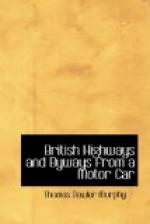We were preparing to leave Netley when a man in plain clothes approached us, and civilly touching his hat, inquired if I were the owner of the motor car. I confessed that I was and he stated he was an officer and regretted that he would have to report me to the police captain for leaving the car standing on a public walk. I had inadvertantly left the machine so that it partially obstructed the narrow gravel walk alongside the road, and some of the citizens had no doubt complained to the officer. We were naturally enough much chagrined, not knowing how much inconvenience and delay this incident might cause. The constable took my name and the number of the car and said I could report the circumstance myself to the captain of the police. I desired him to accompany me to call on this dignitary, but he did not seem at all anxious for the job.
This is the general procedure in England. An arrest is very seldom made in a case of this kind. The officer simply takes the name and number and the motorist can call on the proper official himself. The police system is so perfect that it would be quite useless to attempt to run away, as would happen if such a system were pursued in this country. If, in the judgment of the police official, the case should come to trial, a summons is served on the offender and the date is set. This is what I feared might happen in this case, and as it was within a week of our sailing time, I could imagine that it might cause a great deal of inconvenience.
I found the police captain’s office in a neatly kept public building with a flower garden in front of it. I put the case to the captain, and after he had learned all the particulars he hastened to assure me that he would waive prosecution of the offense. He said some of the people in Netley were prejudiced against motors and no doubt were annoyed by the numerous tourists who came there to visit the abbey. Thus all the difficulties I had conjured up faded away and I had a pleasant conversation with the captain, who was a thorough gentleman. He said that the motor car was detested by many people, and no doubt with reason in some cases; but it had come to stay and forbearance and common sense were needed on part of motorist and the public generally. Much of the trouble, he stated, is due to reckless motorists who disregard the rights of other people. The week previous they had considerable difficulty in his district with an American who drove his car recklessly and defied regulations, and it was such performances that were responsible for the prejudice against the motor. This incident was my only personal experience with the British police in official capacity, barring a friendly admonition or two in London when I managed to get on the right side of the road—which is literally the wrong side in Britain.




